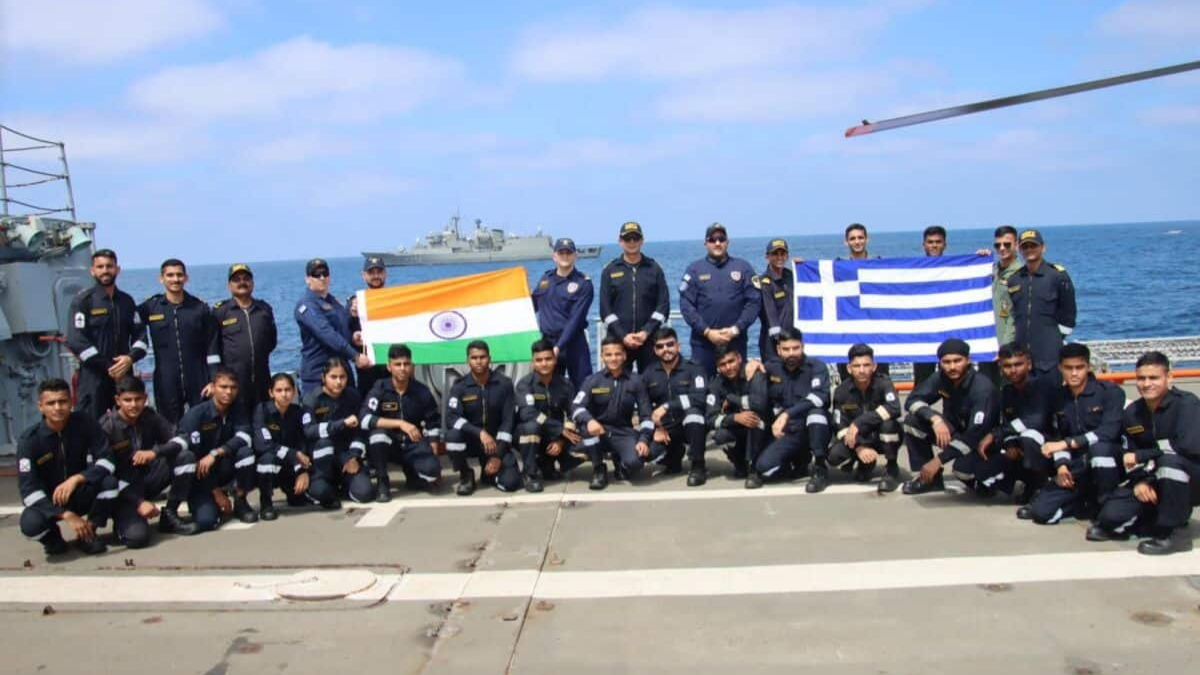Why India’s missile supply to Greece worries Turkey: Athens–Istanbul regional tensions explained
 Image of Indo-Greek Naval personnel used for representation | X
Image of Indo-Greek Naval personnel used for representation | X
Deputy Chief of Army Staff Lieutenant General Rahul R Singh recently confirmed on Friday that Turkey had provided substantial support to Pakistan during the recent fighting with India. He said that Bayraktar drones (Turkish unmanned vehicles) and military experts were also deployed, enabling Pakistan to accurately identify the position of the Indian forces.
Turkish President Recep Tayyip Erdogan had also shown support for Pakistan during Operation Sindoor, which was India’s response to the Pahalgam terrorist attack.
Meanwhile, during a recent visit to Athens, Indian Air Force Marshal VR Chaudhari met with his Greek counterpart. Greek media reports say that the countries have signed an agreement on defence cooperation, with India agreeing to supply Greece with its Long-Range Land Attack Cruise Missile (LR-LACM).
The news of Greece acquiring weapons from India has created unease in Ankara. The missile deal could possibly rewrite the dynamics of the Eastern Mediterranean, according to The Diplomat. An article by TR Harber suggested that Greece was acquiring the missiles and seeking operational insights from India’s Operation Sindoor to prepare for an offensive against Ankara.
Why is Turkey worried about Greece acquiring missiles from India?
India has been slowly expanding its presence in several West Asian countries, particularly Greece, Cyprus, and Armenia. The Greek City Times dubbed it India’s new West Asia quad to counter Turkey’s influence. Recently, New Delhi sought the help of Armenia to evacuate its citizens stranded in the Iran-Israel conflict zone, strengthening its ties with the country.
Prime Minister Narendra Modi also visited Cyprus to improve bilateral relations. The recent visits to these three countries and improved engagement have positioned India as a constructive regional partner to counter Turkey’s regional influence, according to Massis Post, an Armenian outlet.
The Aegean dispute and the history of Turkey-Greece relations
Turkey and Greece have had a long history of disputes over maritime borders in the Aegean Sea. The sea is bordered by several countries, making it a complicated process to determine the delimitation of Exclusive Economic Zones (EEZ). Both Turkey and Greece have argued over maritime territories and airspace and have competed over gas reserves and the right to exploit these resources in the sea.
Greece cites the UNCLOS to extend its maritime claim up to twelve nautical miles, which is also the extent of the area claimed by its islands. Turkey is not a signatory to the convention. The country responded by sending out exploration vessels into the disputed waters, further intensifying the tensions. According to the Turkish Ministry of Foreign Affairs, Greece claiming twelve nautical miles would mean that they would acquire about 71.5 per cent of the Aegean Sea, leaving Turkey with only 8.8 per cent. According to the ministry, this extension would deprive Turkey of its basic right to access the high seas.
In addition to the Aegean Sea dispute, the countries have also accused each other of violating international conventions and claiming more national airspace than is permitted under the framework of the International Civil Aviation Organisation.
Another claim Turkey has made is that Greece has been training and conducting military activities on demilitarised islands in the Aegean Sea, violating their status. The demilitarised status of these islands was agreed upon in the 1923 Lausanne Peace Treaty. Turkey claims that Greece has been violating the treaty's terms since the 1960s. Greece responded by asking Turkey to respect its sovereignty over islands such as Rhodes, Kos, Lesbos, and Chios and its borders, as well as its right to self-defence. Ekathimerini reported that Greece has watched warily as Turkey gains more influence in Europe and tries to obtain F-35 fighter jets from the US.
Recently, Turkish President Erdogan said that “Greece’s concerns about our defence steps are groundless and meaningless” and that “Turkey is not a threat to any country that does not threaten its security, interests, or act with hostility.”
Turkey’s other disputes
Turkey has also had maritime border disputes with Cyprus. The country illegally occupied parts of northern Cyprus in 1974. The territory has not been recognised internationally as Turkish and has caused concerns about the country’s territorial ambitions, according to The Greek City Times.
Turkey also showed support to Azerbaijan during the Nagorno-Karabakh war, in which Armenia was defeated. The country turned to India for crucial defence supplies. Amid the growing relations, there have been calls for India to acknowledge the 1915–16 Armenian genocide during World War I in the Ottoman Empire.
World